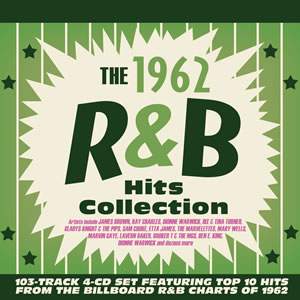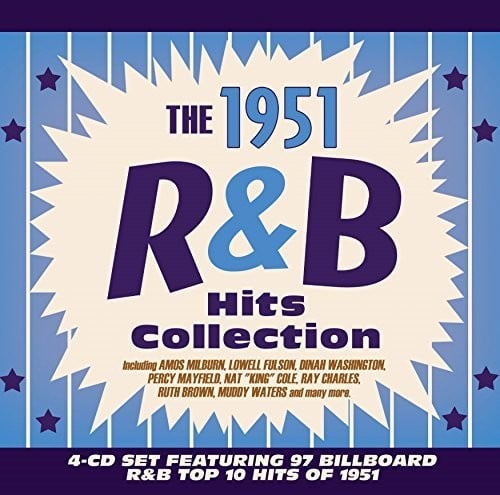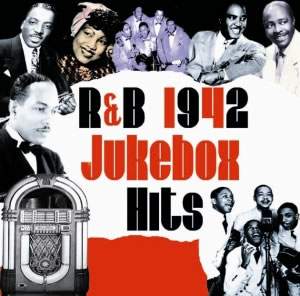 A long, long time ago, in a galaxy far, far away…
A long, long time ago, in a galaxy far, far away…
The best music in the country was also the most popular. Jazz, in both small and big band sounds, rule the air waves, the movies and even the record shops. The most common way that people heard music back in the day before computers and iphones was either on a radio broadcast or sitting in some diner or bar and putting a coin into a jukebox machine that would play a specific song for you. And, while in the forties jazz ruled the world, it eventually melded with blues to create a whole new 
genre, called “Rhythm and Blues”, essentially leading to and becoming a conduit for what became known as “rock and roll”. This collection of reissues focuses on the Jazz/R&B songs and artists that reflected the halcyon days of popular music, mostly pre Beatles. Where did we go wrong?
The over-riding musical trend of the 1942 and 1943 Jukebox Hits is infectious beat and pulse of blues and boogie woogie. Freddie Slack’s “Cow Cow Boogie” reflects the latter, and Earl Hines’ orchestra featuring the bold baritone vocals of Billie 
Also popular during this time were jumping blues, delivered with humor by Louis Jordan, as on “Chick I Pick Ae Slender and Tender and Tall”, while hip canaries such as Peggy Lee and Helen Forrest chirp on “Why Don’t You Do Right?” and “I’ve  Heard That Song Before” with Benny Goodman and Harry James, respectively. Duke Ellington had a number of popular hits during this time as well, with “Sentimental Lady”, “A Slip of the Lip (Can Sink A Ship)” and “Don’t Get Around Much Anymore”. The airwaves were golden during WWII.
Heard That Song Before” with Benny Goodman and Harry James, respectively. Duke Ellington had a number of popular hits during this time as well, with “Sentimental Lady”, “A Slip of the Lip (Can Sink A Ship)” and “Don’t Get Around Much Anymore”. The airwaves were golden during WWII.
Post War, and by the time you get to 1951, blues, both shuffled and unshuffled, abounded. Piano players, singing and playing, dominated the chards, with newcomers like Ray Charles (“Baby Let Me Hold Your Hand”), Amos Milburn (“Bad, Bad Whiskey”), Charles Brown (“Black Night”) and Memphis Slim (“Mother Earth”) and Fats Domino (“Rockin’ Chair”) singing at the ivories while Piano Red pounds it on “Rockin’ With Red”. Chicago blues got into the picture here as well, with Muddy Waters (“Louisiana Blues”), as well as BB King coming up from the South and throwing down the gauntlet on “Three O’Clock Blues”.You also get what is arguably the first “rock and roll” song, namely Ike Turner’s “Rocket 88”, which is before he had his “hits” with Tina. Vocalists of the time include a rough and ready Dinah Washington on “I Won’t Cry Anymore”, Percy Mayfield crooning out “What I Fool I Was” and Joe Turner coming in from Kansas City on “Chains Of Love”. Big toned balladeers included Billy Eckstine and his classic “I Apologize” and Ellingtonian Al Hibbler boldly delivering “What Will I Tell My Heart”. Deep roots are dug here.
By 1955, the juke joints were jumping, with the latest musical trend being doo wop. Thus, velvety harmonies by The Penguins (“Earth Angel”), The Moonglows (“Sincerely”), The Clovers (“Blue Velvet”) and The Hearts (“Lonely Nights”) deliver street corner symphonies, while on the other side of the tracks, Joe Turner belts out “Flip Flop and Fly” and Ruth Brown smacks it down on “Bye Bye Young Men”. Gritty tones are hammered out by Jimmy Reed on “You Don’t Have To Go” and Fats Waller lays down the foundation for rock and roll with “Don’t You Know”. The apotheosis of American music before the onslaught of The Philistines.
By 1960, Elvis had changed music, and had just got back from the Army. In his wake, artists both black and white responded with songs of either vocal dynamism, reflected by the likes of Jackie Wilson (“Doggin’ Around’) or emotions as produced by Roy Orbison (“Only The Lonely”). The rock “beat” slowly replaced the swing feel of an earlier generation, with a harder feel as on Freddy Cannon’s “Way Down Yonder In New Orleans” and Gary US Bonds pounding out “New Orleans” with a nice mix of the two on Bobby Darin’s “Beyond The Sea”. Most notable is that while there are still some wonderful vocal groups like The Platters (“Harbor Nights”) and The Drifters (“Save The Last Dance”) , there is a new group of singers that create a whole new mix of blues and gospel. James Brown hits the floor along (“I’ll Go Crazy”) with Aretha Franklin (“Today I Sing The Blues”), Ike and Tina Turner (“A Fool In Love”) , and Etta James (“At Last)to put some punch into the airwaves. In contrast, cutesy songs like “Itsy Bitsy Teeny Weenie Yellow Polka Dot Bikini” competed with dance crazes like “The Twist” and dreamy ballads like Jimmy Reeves “He’ll Have To Go” and Percy Faith’s “A Summer Place”. Pre Beatles sounds.
The Billboard R&B Charts for 1961 was filled with soul crooners and dance craves. Of the latter, Chubby Checker was still riding The Twist wave with “The Fly” while doo wop was still holding it’s own, but with a more earthy feel, as on “Gypsy Woman” by The Impressions. Smokey Robinson gets a hit on “Shop Around” with other pop hits including “Please Mr. Postman” by The Marvelettes. But the main focus during this year were romantic gents, such as Jerry Butler (“He Will Break Your Heart”), Gene McDaniels (“A Hundred Pounds Of Clay”) and Ben E. King (Amor” and “Stand By Me”). Compared to what was happening to the white pop charts, the black music was on a completely higher plane, eventually influencing white rockers and getting them off of he Fabian and Bobby Rydell cycle.
1962 was the last year before The Beatles and Bob Dylan hit America, and the mix of black church, blues and ballads hits stride. The Twist gets a revival with Chubby Checker, King Curtis, Sam Cooke and Gary US Bonds, and Ray Charles hits one of his many high points this year with “Unchain My Heart”, “I Can’t Stop Loving You” and “At The Club”. A portend of things to come from Memphis is heard with Booker T and The MGs, eventually the backup band for Otis Redding and Wilson Pickett, grooving on the eternally jamming classic “Green Onions”. Yes, there are some wondefully drippy tunes like “Hey Paula”, “The Lion Sleeps Tonight” and “Roses Are Red”, but also rollicking gospel blues like “Somebody Have Mercy” by Sam Cooke”, and Jimmy Smith’s “Walk On The Wild Side”. The last hurrah before the attack of The Barbarians.
